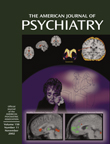Tardive Dyskinesia With Risperidone and Anticholinergics
Ms. A, a 40-year-old woman who had never taken psychotropics, developed dysarthria and salivation 2 months into risperidone treatment (3–6 mg/day). Although this was resolved within 2 weeks by the addition of biperiden (3 mg/day), Ms. A’s lips and jaw showed signs of moderate dyskinesia. Risperidone administration was then gradually terminated over 2 weeks and replaced with olanzapine (7.5 mg/day), which was increased to 10 mg/day 2 weeks later. The symptoms of dyskinesia disappeared 23 days after the discontinuation of risperidone and have not reappeared since (5 months to date).Ms. B was a 28-year-old woman who also had no prior experience with psychotropics. Initially treated with amoxapine (an average of 125 mg/day), she was given risperidone (2 mg/day), which was titrated to 9 mg/day over 7 days. Three weeks later, she developed dysarthria and salivation, requiring either biperiden (6 mg/day) or trihexyphenidyl (4 mg/day). She developed dyskinesia in her lips and jaw 2 months into treatment. This was cured within 6 weeks by gradual termination of risperidone administration and replacement with quetiapine (100–200 mg/day). Ms. B has not had dyskinesia since (8 months to date).Ms. C, a 24-year-old woman, had taken chlorpromazine (an average of 75 mg/day) and haloperidol (an average of 6 mg/day) for less than 6 weeks. Four months before the treatment, she had also experienced ECT five times. Initially, she had started with haloperidol (an average of 18 mg/day) but was then given risperidone (2 mg/day) and biperiden (2–4 mg/day) because of dysarthria and salivation. Two months later, she developed lip and tongue dyskinesia, requiring replacement of risperidone with quetiapine (150 mg/day) over 6 weeks, as in the case of Ms. B. She has not had dyskinesia since (6.5 months to date).
References
Information & Authors
Information
Published In
History
Authors
Metrics & Citations
Metrics
Citations
Export Citations
If you have the appropriate software installed, you can download article citation data to the citation manager of your choice. Simply select your manager software from the list below and click Download.
For more information or tips please see 'Downloading to a citation manager' in the Help menu.
View Options
View options
PDF/EPUB
View PDF/EPUBLogin options
Already a subscriber? Access your subscription through your login credentials or your institution for full access to this article.
Personal login Institutional Login Open Athens loginNot a subscriber?
PsychiatryOnline subscription options offer access to the DSM-5-TR® library, books, journals, CME, and patient resources. This all-in-one virtual library provides psychiatrists and mental health professionals with key resources for diagnosis, treatment, research, and professional development.
Need more help? PsychiatryOnline Customer Service may be reached by emailing [email protected] or by calling 800-368-5777 (in the U.S.) or 703-907-7322 (outside the U.S.).

